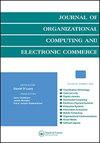Destination management systems’ adoption and management model: proposal of a framework
IF 1.9
4区 管理学
Q3 COMPUTER SCIENCE, INFORMATION SYSTEMS
Journal of Organizational Computing and Electronic Commerce
Pub Date : 2020-02-13
DOI:10.1080/10919392.2020.1724765
引用次数: 12
Abstract
ABSTRACT The fast development in information and communication technologies transformed the tourism sector, raising relevant questions regarding the role of destination management organizations (DMOs) and the most appropriate way to implement and manage online platforms adopted by these organizations – destination management systems (DMSs). Nevertheless, the research concerning DMSs' adoption and management is scarce, mostly conceptual and highly fragmented, usually corresponding to theoretical discussions on a small set of adoption or management issues or to analysis of very specific examples of DMSs. This paper aims to overcome gaps in previous literature by deeply analyzing relevant factors for the adoption and management of this kind of systems. In-depth interviews were conducted with relevant organizations in DMS development and several American and European DMOs. The content analysis of the discourses resulted in a framework encompassing an adoption and management model – including reasons and challenges regarding DMSs’ adoption, management models, benefits resulting from DMS adoption – as well as current challenges and future perspectives for DMSs. The findings provide relevant theoretical and practical contributions. Theoretically, the paper highlights some discrepancies between the literature and the present study regarding the concept of DMSs, as well as reasons and challenges associated with their adoption and management. The need to rethink the role and management of these systems is also remarked. From a practical perspective, the framework proposed can be used by DMOs and other stakeholders engaged in the management of tourism destinations, in order to ensure the successful implementation and management of DMSs.目的地管理系统的采用和管理模式:框架提案
摘要信息和通信技术的快速发展改变了旅游业,引发了关于目的地管理组织(DMO)的作用以及实施和管理这些组织采用的在线平台的最合适方式——目的地管理系统(DMS)的相关问题。然而,关于DMS的采用和管理的研究很少,大多是概念性的和高度分散的,通常对应于对一小部分采用或管理问题的理论讨论,或对DMS的非常具体的例子的分析。本文旨在通过深入分析采用和管理这类系统的相关因素来克服以往文献中的空白。对DMS开发的相关组织以及几个美国和欧洲DMO进行了深入访谈。对话语的内容分析形成了一个包含采用和管理模式的框架,包括采用DMS的原因和挑战、管理模式、采用DMS带来的好处,以及DMS的当前挑战和未来前景。研究结果提供了相关的理论和实践贡献。从理论上讲,本文强调了文献和本研究在DMS概念方面的一些差异,以及与采用和管理相关的原因和挑战。有人还指出,有必要重新思考这些系统的作用和管理。从实际角度来看,DMO和其他参与旅游目的地管理的利益相关者可以使用所提出的框架,以确保DMS的成功实施和管理。
本文章由计算机程序翻译,如有差异,请以英文原文为准。
求助全文
约1分钟内获得全文
求助全文
来源期刊

Journal of Organizational Computing and Electronic Commerce
工程技术-计算机:跨学科应用
CiteScore
5.80
自引率
17.20%
发文量
7
审稿时长
>12 weeks
期刊介绍:
The aim of the Journal of Organizational Computing and Electronic Commerce (JOCEC) is to publish quality, fresh, and innovative work that will make a difference for future research and practice rather than focusing on well-established research areas.
JOCEC publishes original research that explores the relationships between computer/communication technology and the design, operations, and performance of organizations. This includes implications of the technologies for organizational structure and dynamics, technological advances to keep pace with changes of organizations and their environments, emerging technological possibilities for improving organizational performance, and the many facets of electronic business.
Theoretical, experimental, survey, and design science research are all welcome and might look at:
• E-commerce
• Collaborative commerce
• Interorganizational systems
• Enterprise systems
• Supply chain technologies
• Computer-supported cooperative work
• Computer-aided coordination
• Economics of organizational computing
• Technologies for organizational learning
• Behavioral aspects of organizational computing.
 求助内容:
求助内容: 应助结果提醒方式:
应助结果提醒方式:


